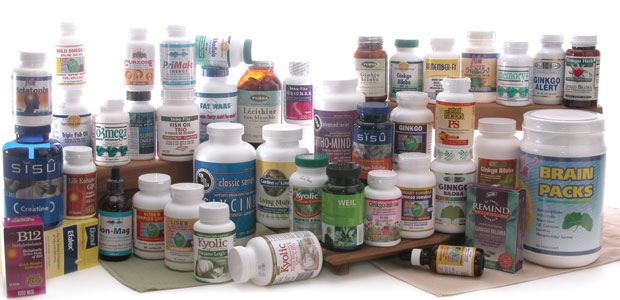Advertisement
Boost Your Brain Power
Memory loss can happen to anyone. Children with attention deficit disorder, parents under stress, students cramming for exams, and aging seniors all experience a degree of forgetfulness and lack of concentration. According to Dr. Michael Colgan, a nutritional research scientist, antiaging expert, and the best-selling author of The New Nutrition (Apple Tree Publishing, 2000), people … Continued

Memory loss can happen to anyone. Children with attention deficit disorder, parents under stress, students cramming for exams, and aging seniors all experience a degree of forgetfulness and lack of concentration.
According to Dr. Michael Colgan, a nutritional research scientist, antiaging expert, and the best-selling author of The New Nutrition (Apple Tree Publishing, 2000), people in their mid 40s and older would be wise to start now to prevent future memory loss with dietary, nutritional, and lifestyle changes.
Here’s a list of nutritional and herbal memory enhancers recommended by nutritional experts.
Memory-Enhancing Nutrients
Vitamin B-complex is important for optimal brain and memory function: vitamin B6 (pyridoxine) plays a specific role in recollecting dreams. Inositol and choline (lipotropic factors) are particularly useful for supporting memory and reducing the effects of stress. Vitamin B3 (niacin) supports circulatory health and promotes blood flow to the brain. Folic acid and B12 (cobalamin) function in conjunction with vitamin B6 to reduce blood levels of homocysteine, which is known to cause brain aging and contribute to plaque build-up. The recommended dosage for a complete B-complex supplement is 50 to 100 mg daily.
Vitamin C with bioflavonoids provides powerful antioxidant activity that inhibits free-radical damage to brain cells and improves circulation to the brain. The suggested dosage is 1,000 mg daily.
Omega-3 oils (wild salmon oil or flaxseed oil) contain the ideal essential fatty acids required for brain development and function. A dosage of 500 to 1,000 mg taken two or three times daily is suggested.
Glutamine and glycine, two amino acids, have been reported to improve memory and cognition. A study published in Nutritional Neuroscience in October 2003 reported that healthy middle-aged and elderly men and women (aged 40 to 76) who took a combination of glutamine, glycine, and niacin showed measurable improvements in memory, vigour, and growth hormone secretion.
Coenzyme Q10 was reported in the American Journal of Alzheimer’s Disease in January 2005 to be of benefit when used within an integrated treatment program. Researchers from the Stress Relief and Memory Training Center in Brooklyn, New York, reported improved cognitive function in demented and clinically depressed patients. The average dosage recommendation is 30 mg two or three times daily.
Phosphatidylserine (PS) is a naturally occurring component of the membranes that enclose nerve cells. Several small studies have indicated that PS supplements may help prevent age-related mental decline and slow the progression of Alzheimer’s disease by strengthening cell membranes and protecting them from the stress hormone cortisol. Recommended dosage is 100 mg daily to maintain optimal brain function, 200 mg to treat mild cognitive impairment, and 300 mg to treat more severe memory loss. If you are taking prescribed anticoagulant drugs, check with your physician before using PS.
Herbal Memory Support
Ginkgo biloba, the most frequently recommended herbal product in the world, stimulates circulation and leads to improved mental clarity, alertness, and memory. Choose a standardized extract containing 24 percent ginkgo flavonoids and 6 percent terpene lactones. Follow dosage recommendations on the label. If you are taking prescription blood thinners, check with your medical advisor before using ginkgo biloba.
Rhodiola rosea root is used extensively in Russian and Scandinavian countries, where its medicinal properties have been clinically studied and reported in the scientific literature. It is most commonly used as a tonic and remedy for fatigue, poor attention span, and decreased memory. Herbalgram, the journal of the American Botanical Council, recently reported that numerous human, animal, and cellular studies of rhodiola have shown that it helps prevent fatigue, stress, and the damaging effects of oxygen deprivation.
Panax ginseng extract, especially in combination with Ginkgo biloba extract, showed significant memory enhancing effects in healthy middle-aged subjects in a double-blind,
placebo-controlled study. The study ran for 14 weeks and found improvements to a number of different aspects of memory.
Turmeric and ginger, two pungent spices commonly used in South Asian cooking, have shown great potential in studies designed to block the inflammatory response associated with the development of Alzheimer’s disease. Dr. Andrew Weil, author and founder of the Integrative Medicine Program, strongly recommends including supplements and foods containing these two spices. Dr. Weil reports that elderly
villagers in India have the lowest rate of Alzheimer’s disease in the world and that researchers speculate turmeric is responsible.
Brew a Better Memory
A variety of herbal teas can also be useful in supporting memory function. Passion flower, camomile, and lemon balm are especially helpful to soothe the stress often related to memory lapses. Green and black teas have been shown to improve memory and mental functioning, especially when taken in the evening. Brew 1 tsp (5 mL) loose herbs or a teabag in 1 cup (250 mL) hot water, and steep 10 minutes.
Homeopathic Memory Support
Homeopathic remedies and tissue salts can be beneficial in a memory-enhancement program. A qualified homeopath can help you determine individual needs. The basic remedies generally recommended for memory-related conditions include Calcarea carbonica, Kali phosphoricum, Calcarea phosphorica, Natrum muriuaticum, and Natrum sulphuricum.
Whether you experience temporary lapses in memory due to stress or have begun to notice worrisome episodes of memory loss associated with aging, the sooner you start to nourish your brain, the better your quality of life will be. Just remember that.




